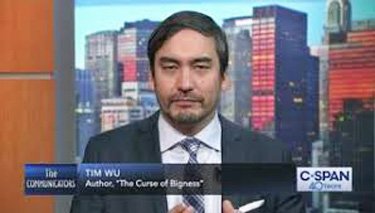Anti-First Amendment Scholar Appointed to Major White House Policy Position
First Amendment, Left-wing Intolerance, Timothy Wu

Timothy Shiou-Ming Wu 吴修铭
Matt Taibbi has bad news for Americans who still care about Free Speech and the open exchange of opinions.
When Columbia law professor Timothy Wu was appointed by Joe Biden to the National Economic Council a few weeks back, the press hailed it as great news for progressives. The author of The Curse of Bigness: Antitrust in the New Gilded Age is known as a staunch advocate of antitrust enforcement, and Biden’s choice of him, along with the appointment of Lina Khan to the Federal Trade Commission, was widely seen as a signal that the new administration was assembling what Wired called an “antitrust all-star team.”
“Big Tech critic Tim Wu joins Biden administration to work on competition policy,” boomed CNBC, while Marketwatch added, “Anti-Big Tech crusader reportedly poised to join Biden White House.” Chicago law professor Eric Posner’s piece for Project Syndicate was titled “Antitrust is Back in America.” Posner noted Wu’s appointment comes as Senator Amy Klobuchar has introduced regulatory legislation that ostensibly targets companies like Facebook and Google, which a House committee last year concluded have accrued “monopoly power.”
Wu’s appointment may presage tougher enforcement of tech firms. However, he has other passions that got less ink. Specifically, Wu — who introduced the concept of “net neutrality” and once explained it to Stephen Colbert on a roller coaster — is among the intellectual leaders of a growing movement in Democratic circles to scale back the First Amendment. He wrote an influential September, 2017 article called “Is the First Amendment Obsolete?” that argues traditional speech freedoms need to be rethought in the Internet/Trump era. …
Listening to Wu… is confusing. He calls himself a “devotee” of the great Louis Brandeis, speaking with reverence about his ideas and those of other famed judicial speech champions like Learned Hand and Oliver Wendell Holmes. In the Aspen speech above, he went so far as to say about First Amendment protections that “these old opinions are so great, it’s like watching The Godfather, you can’t imagine anything could be better.”
If you hear a “but…” coming in his rhetoric, you guessed right. He does imagine something better. The Cliff’s Notes version of Wu’s thesis:
— The framers wrote the Bill of Rights in an atmosphere where speech was expensive and rare. The Internet made speech cheap, and human attention rare. Speech-hostile societies like Russia and China have already shown how to capitalize on this “cheap speech” era, eschewing censorship and bans in favor of “flooding” the Internet with pro-government propaganda.
— As a result, those who place faith in the First Amendment to solve speech dilemmas should “admit defeat” and imagine new solutions for repelling foreign propaganda, fake news, and other problems. “In some cases,” Wu writes, “this could mean that the First Amendment must broaden its own reach to encompass new techniques of speech control.” What might that look like? He writes, without irony: “I think the elected branches should be allowed, within reasonable limits, to try returning the country to the kind of media environment that prevailed in the 1950s.”
— More ominously, Wu suggests that in modern times, the government may be more of a bystander to a problem in which private platforms play the largest roles. Therefore, a potential solution (emphasis mine) “boils down to asking whether these platforms should adopt (or be forced to adopt) norms and policies traditionally associated with twentieth-century journalism.”
That last line is what should make speech advocates worry.
The kind of media environment favored by Wu (and other radical leftists) “that prevailed in the 1950s” is a regulated monopoly of three network sources all in complete agreement on the Overton Window, the range of acceptable political discourse, i.e. No Rush Limbaugh, no Fox News, no right-wing blogs.



